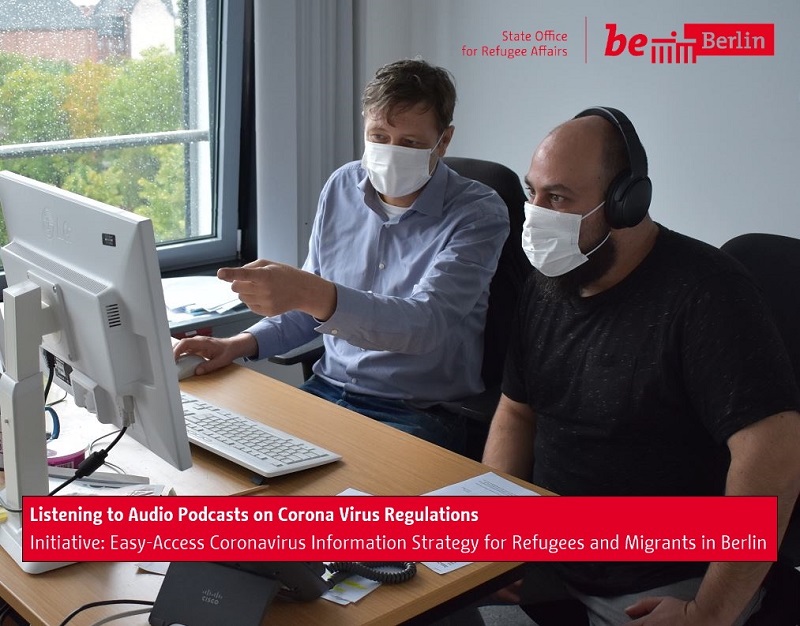BERLIN, GERMANY
Easy-to-Access Information
Strategy on the Coronavirus for Refugees and Immigrant Communities in Berlin

The city of Berlin is home to 3.7 million residents, including around 100,000 refugees. According to the federal law that asylum seekers shall be provided shelters during their application, 20,000 refugees live in refugee homes currently. To prevent these relatively high-density places from becoming COVID-19 hotspots, health and safety regulations have been conveyed to the refugees and implemented. Usually, the state provides such information, but in texts and in German only. However, the refugees speak 14 different languages and come from various cultural, social, and educational backgrounds – with some being completely analphabetic. To make matters worse, it was impossible for the translators to reach them in person due to the lockdown.
As a result, the city used digital audio podcasts to deliver official and reliable information about the virus and health protocols. The city translated Covid-related information with the help of inhouse translators to the 14 languages spoken by the refugees and uploaded it to the official website. Then, through social media and by word of mouth of the shelter operators, the city spread the word about this authoritative information channel.
Because the digital platforms were already there, the initiative did not place a burden on the city’s treasury: the total cost did not exceed 1,000 US dollars. For the refugees, it provided timely and correct information, which helped stop misinformation in the shelters and disperse their fear. This also led to a higher level of cooperation from the refugees, especially with regard to quarantine regulations.
As the podcasts have been uploaded online, anyone with Internet access is able to listen to them. Originally designed to communicate with the residents of refugee homes, this tool has transcended the boundaries of the shelters. In cooperation with district officials, NGOs, and volunteers, the city has extended this service to refugees, migrants, and other non-German speaking groups outside the shelters.
This initiative promotes the achievement of SDGs 3 (good health and wellbeing), 10 (reduced inequalities), 11 (sustainable cities and communities), and 16 (peace, justice, and strong institutions).


 In Focus | World Cities Day: People-Centred Smart Cities
In Focus | World Cities Day: People-Centred Smart Cities City Stories | Fostering community resilience: A lifeline for the Central African Republic
City Stories | Fostering community resilience: A lifeline for the Central African Republic In Focus | Innovative Education, Empowering Futures
In Focus | Innovative Education, Empowering Futures




















 Tel: +86 020 3780 4434
Tel: +86 020 3780 4434 Email: info@guangzhouaward.org
Email: info@guangzhouaward.org Address: Unit 01-7, 28th Floor, No. 7, Chunrong 3rd Road, Tianhe District, Guangzhou, Guangdong, 510000, PRC
Address: Unit 01-7, 28th Floor, No. 7, Chunrong 3rd Road, Tianhe District, Guangzhou, Guangdong, 510000, PRC




